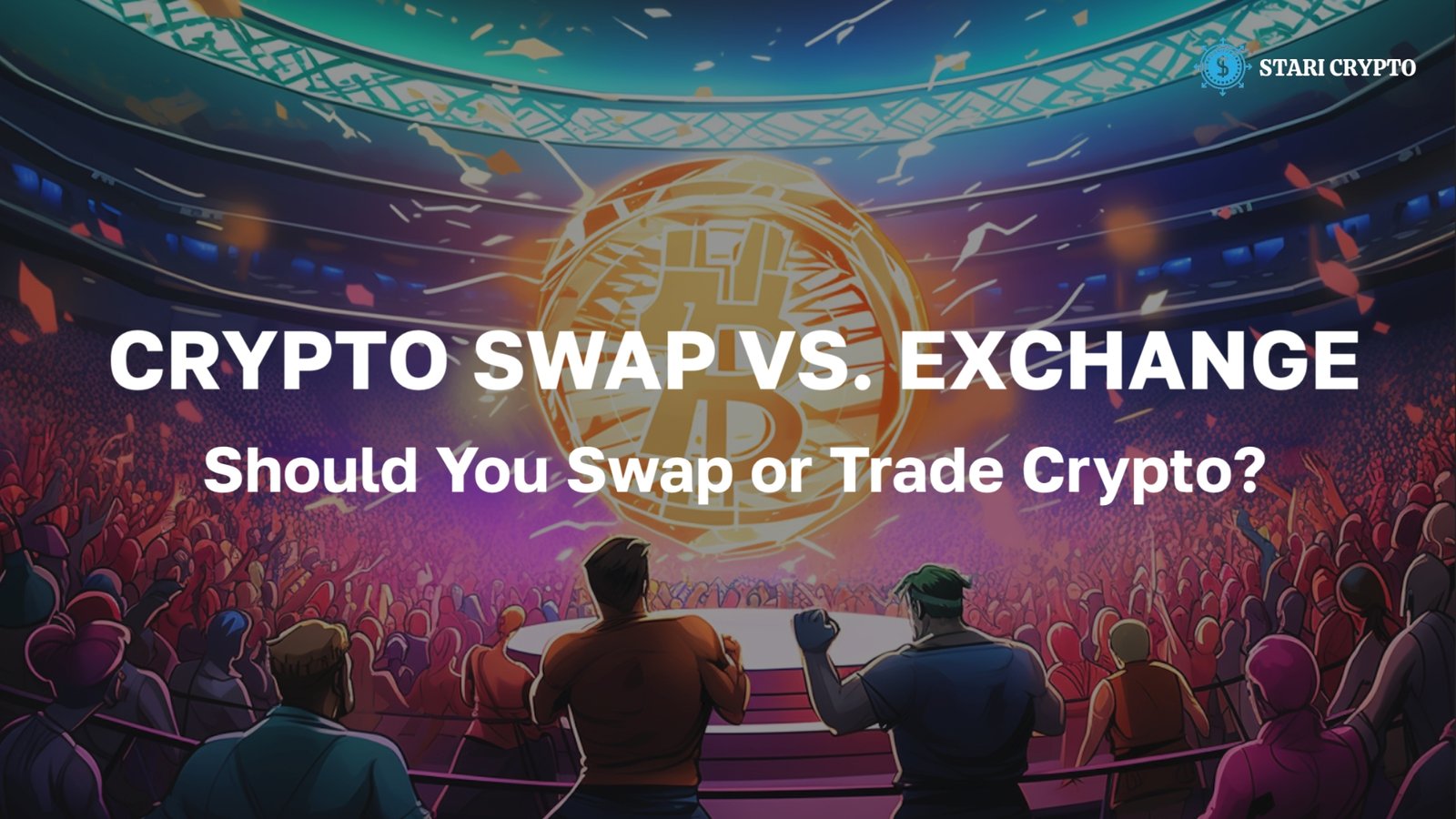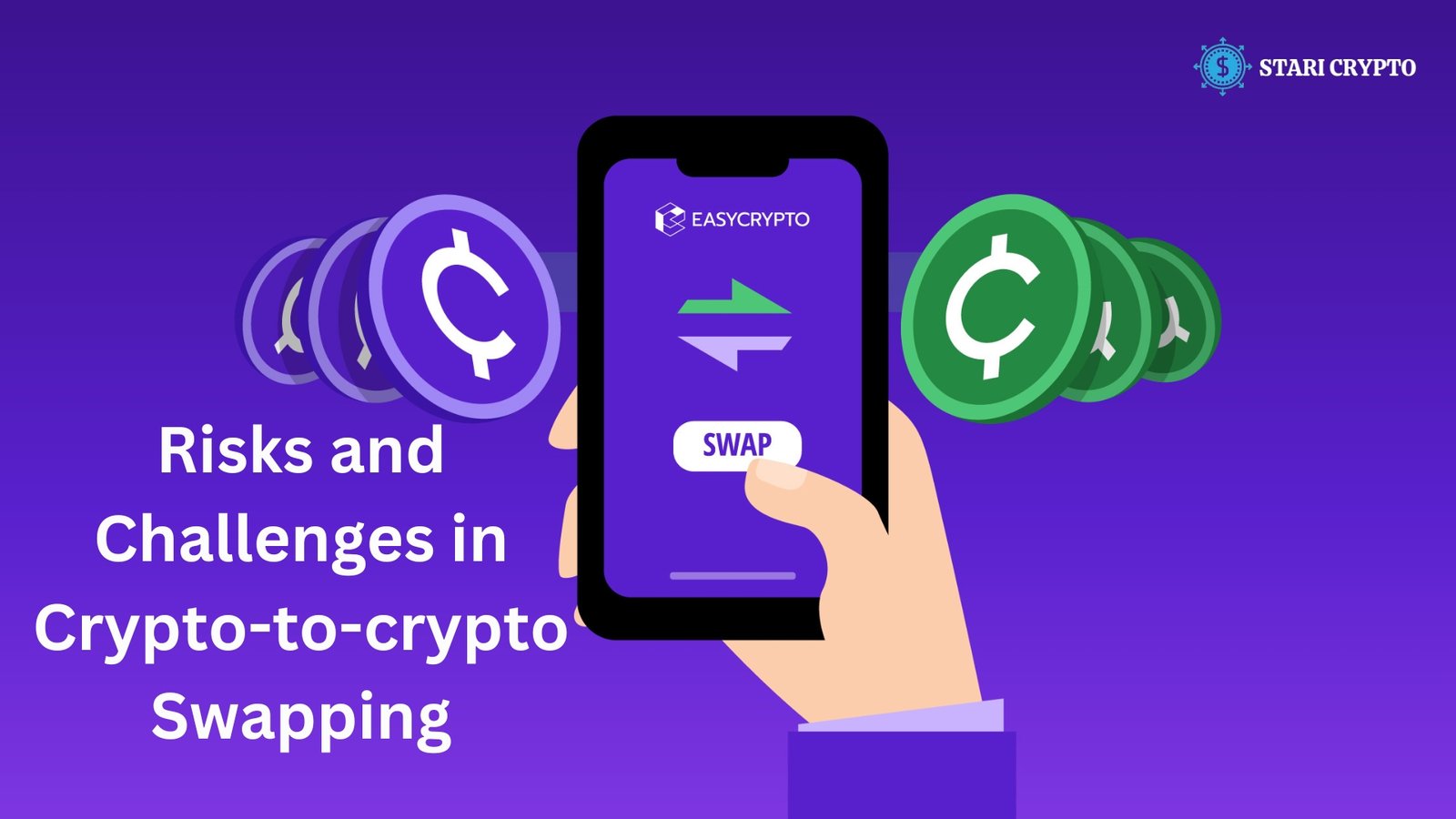Crypto-to-Crypto Swaps: A Complete Explanation. In a crypto-to-crypto swap, two cryptocurrencies are exchanged directly for each other at the current market rate. Unlike more conventional exchanges, which necessitate the deposit of fiat currency and a lengthier procedure, crypto-to-crypto swaps enable the exchange without any hitches. The efficiency and liquidity of cryptocurrency markets are greatly improved via swaps. The ability to trade cryptocurrencies for other coins in a user’s wallet improves ecosystem efficiency and makes censorship and control less likely. Swaps allow users to effortlessly trade between different cryptocurrencies without putting down any fiat money. This allows them to diversify their crypto holdings, take advantage of fresh investment opportunities, and more.
Is Crypto Swapping Better than Trading?

The words “swap” and “trade” might mean the same thing to someone fresh to the world of cryptocurrency. While the result may be comparable, the method is distinct. Crypto trading relies on an order book to conduct transactions, which restricts trades to pairs that are available on the exchange. Trading often begins with buying one coin with fiat money and then moves on to buying another coin with fiat money. The trader will be required to pay a commission at each stage of the procedure, beginning with the sale of cryptocurrency and ending with the purchase of another coin.
In contrast, cryptocurrency swapping facilitates frictionless trading between different digital currencies. Due to the one-time nature of the procedure, there is no need to first convert cryptocurrency to fiat before purchasing another cryptocurrency. With swapping, consumers have more options because they can instantly trade one asset for another.
How Do Crypto-to-Crypto Swaps Work?
Both controlled exchanges (CEXs) and decentralized exchanges (DEXs) facilitate crypto-to-crypto trades. But the mechanism behind the scenes is different. Centralized exchanges (CEXs) facilitate swaps by charging users a fee to access the liquidity pool. For example, when exchanging on Coinbase, the user engages with the platform’s order book. Coinbase functions as the counterparty to a swap by matching a user’s request with liquidity available in its internal pool. While fees for facilitating swaps are usually fixed and clear, they are greater than those of DEXs.
The DEX is a P2P exchange. The necessity for a middleman in the exchange process is eliminated by automated smart contracts that manage liquidity pools that users create. The trade-off is reduced fees, but there’s a chance of slippage if liquidity is tight. One example is Uniswap, which employs liquidity pools that are made up of user-contributed cryptocurrency pairs. In DEXs, smart contracts carry out trades according to the asset pool’s ratio. Instead of engaging in direct trades, the user provides one item and receives the corresponding quantity of the other. Users should be aware of slippage, but generally speaking, fees paid to liquidity providers are cheaper than those on centralized exchanges.
The DEX platform allows users to link their wallets, choose the assets and quantities they want to buy, and then authorize the transaction. Automated transaction execution according to preset parameters (such as volume and price) is what makes smart contracts so useful for facilitating this exchange. Choose the cryptocurrency pairs, enter the amount, and then perform the swap on a CEX or DEX. After the trade is complete, the user’s wallet or the exchange’s infrastructure receives the newly acquired cryptocurrency.
Factors to Consider Before Swapping
Security, liquidity, slippage, transaction costs, network congestion, legal issues, and jurisdictional variations are some of the factors to think about when doing a swap. To make sure the swap goes smoothly, there are a few things a user should think about before proceeding:
Security
Evaluate the platform’s security features. Before committing to a CEX, consumers should research its security certifications and see if its assets are stored in cold storage. Prior to conducting any swapping in a DEX, users should consider the DEX’s security audit and performance history.
Liquidity and slippage
Users need to evaluate the liquidity of the assets they are swapping to avoid substantial price fluctuations during the transaction, which may result in slippage.
Transaction fees and network congestion
Congestion on the network impacts the swap’s price and speed. To avoid unnecessary delays or higher expenses, it is advisable to research the platform’s fees and take the current health of the blockchain network into account.
Regulatory considerations and jurisdictional differences
Users need to keep in mind regulatory factors and variances in the jurisdiction. It is the user’s responsibility to check that their Bitcoin transactions are in accordance with local laws.
Risks and Challenges in Crypto-to-crypto Swapping

Cryptocurrency swappers must consider the following risks: market manipulation, counterparty risk, liquidity risk, regulatory risk, and price volatility. Cryptocurrency trading is not without its difficulties and dangers:
Price volatility
Cryptocurrency prices are highly volatile, with rapid and unpredictable fluctuations. This volatility can affect the value of the assets to undergo swapping, leading to large gains or losses within a short period.
Liquidity risks
A cryptocurrency’s liquidity is its ability to be purchased and traded quickly and easily without a major impact on its price. Delays or unfavorable prices during the switching process could occur if there aren’t enough buyers or sellers for a coin with low liquidity.
Counterparty risk
Users put their trust in the exchange to smooth out cryptocurrency swaps on CEXs. Technical difficulties, bankruptcy, or fraudulent activity on the part of the exchange are all possibilities.
Regulatory risks
The regulatory landscape for cryptocurrencies is still evolving and differs widely across different jurisdictions. Regulation changes could impact the legality or operational aspects of crypto-swapping platforms.
Market manipulation
Market manipulation, in which huge traders or groups of traders artificially manipulate prices to take advantage of other market participants, is a problem in less regulated markets. Users participating in cryptocurrency swaps may experience unforeseen consequences as a result of this.


















